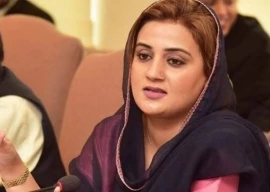
As the special parliamentary committee is meeting today (Tuesday) to consider the next chief justice of Pakistan (CJP), speculations are rife whether the senior-most Judge, Justice Syed Mansoor Ali Shah, will be recommended or superseded on account of his July 13 judgement in the reserved seats case.
The judgement deprived both ruling political parties, PML-N and PPP, along with others, of 78 reserved seats in the national and provincial assemblies. Ruling political parties and powerful circles were clearly upset by the July 12 judgement.
The committee will consider the nominations of Justice Syed Mansoor Ali Shah, Justice Munib Akhtar and Justice Yahya Afridi for the post of the next CJP.
Regarding the nomination of Justice Shah, a cabinet member says that it is a case of 'fingers crossed'.
At the same time, the PML-N nominee for the committee, Khawaja Asif, has continuously expressed fear that an audit of the recent general election could take place after the retirement of current CJP Qazi Faez Isa.
He, in his recent speech, slammed the eight-judge judgement which held that PTI is entitled to reserved seats. Law Minister Azam Nazeer Tarar is also nominated in the committee.
PPP has nominated Senator Farooq H Naek, who is also vice chairman of the Pakistan Bar Council (PBC).
Senator Ali Zafar and Barrister Gohar Ali Khan have also been nominated by the PTI, while Senator Kamran Murtaza of JUI-F is also included in the committee.
Political analysts say that PPP members' opinions will be significant for the nomination of the next CJP.
There was a time when PPP Chairman Bilawal Bhotto Zardari said that Justice Syed Mansoor Ali Shah would be the next CJP of the Supreme Court. However, lawyers believe that powerful circles are yet to have their day. Justice Shah is known as an independent judge who is not always in the best books of the powers that be.
There are also doubts that if one of the candidates declines to become the next CJP, then the government have to consider the two remaining judges.
One ex AGP states that sub section (3) to Article 175-A provides for three steps in such a case. He says that if the first nominee chosen by the committee accepts, then the matter comes to an end. However, if he declines, the next step is to choose a nominee for the next CJP from the two remaining judges.
If they also decline, then step 3 would be to consider the fourth senior-most judge.
"Nothing is redundant. This makes sense because the committee must first exhaust possibility of nominating the three senior-most judges. Only when they all decline can the committee move to the fourth senior-most judge," the ex-AGP states.
However, a government official does not agree with the ex-AGP's interpretation and said that once a candidate is considered and not nominated, they cannot be reconsidered. "Any other reading will make the second proviso redundant," he adds.
Lawyers, meanwhile, are convinced that in case Justice Afridi declines, then the committee is bound to consider the two remaining senior-most judges.
Ex-attorney general Tariq Mahmood Khokhar says that amending the constitution well past midnight had the sole purpose of barring the senior puisne judge from being appointed as the CJP, whatever the cost.
*And the cost is very high: diminished rule of law, diminished independence of judiciary; diminished democratic legitimacy; and, a constitutional catastrophe. This is pure Machiavellian sophistry and its consequences will be incompatible with the salient features of the constitution", he adds.
Khokhar says that Justice Mansoor Ali Shah is a modern-minded judge, ferociously independent, imbued with enormous intellect, clarity and authority. His actions and demeanour are magisterial. A restrained judge with an unrestrained reforming streak; one of the most respected judges of this era and beyond.
"His contrived ouster from the apex of the judiciary, at a critical moment in our history, is indefensible. Should he opt to resign, don't expect him to retire into oblivion. Unconstrained, he will be more open, more active and more vocal in public and the academia, here and abroad," he adds.
Dr Yasser Kureshi, who recently wrote a book on the history of judicial politics, said that on the face of it, there is nothing exceptional about a parliamentary committee selecting the chief Justice from a panel, as legislatures have been involved in the process in selecting chief justices in other countries, such as the US, as well.
"But for the parliamentary committee to play its role as prescribed, it must be democratically representative with ruling and opposition parties meaningfully represented in the process."
Kureshi continues that with the ruling coalition's current refusal to allow PTI to take its place in opposition as the largest party in parliament, it is unlikely that this parliamentary committee will be representative. "It will not do anything, but rubber-stamp the choice of the ruling parties. In the future, judges seeking the top spot will start lobbying ruling parties or other institutions to ensure they get selected"
He also said that the current parliamentary committee may select Justice Mansoor Ali Shah to allay the growing anger within the legal community about the new appointment process, but even if he is selected, the office of CJ now stands a diminished office as many of the most important powers have been shifted to the presiding judge, who the ruling coalition will seek to ensure is a restrained or a pliable judge. "All of this is a pity as few judges have given more consideration to the need for the judiciary to play a democracy-enhancing role quite like Justice Shah," says Dr Kureshi.


1732243059-0/mac-miller-(2)1732243059-0-165x106.webp)

1672385156-0/Andrew-Tate-(1)1672385156-0-165x106.webp)
1732240377-0/mac-miller-(1)1732240377-0-165x106.webp)

1726722687-0/Express-Tribune-Web-(9)1726722687-0-270x192.webp)










COMMENTS
Comments are moderated and generally will be posted if they are on-topic and not abusive.
For more information, please see our Comments FAQ